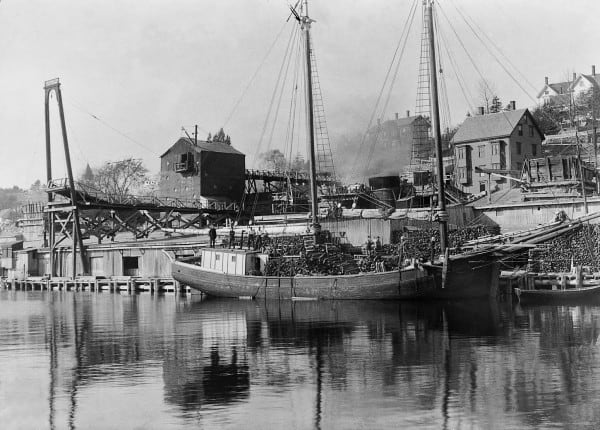Hosted by OCH co-founder Maynard Bray
Bill Bunting’s two books (Parts I and II) entitled A Day’s Work have intrigued us at OCH for some time, having been listed as a favorite read by at least one of our OCH Guides. They’re about life in Maine as it used to be between 1860 and 1920, told in photographs and marvelously informative essays written by Bill. Things maritime are included—about a third of Part II, in fact—and they are what we’ll feature, but there’s great stuff about farming, lumbering, quarrying, ice harvesting, and other commercial pursuits of the late 1800s and early 1900s as well. I guarantee you’ll learn more than you can imagine about how ingenious our forebears were in using brains, brawn, and natural materials like wood.
With Bill’s blessing and that of owner/publisher Jon Eaton of Tilbury House, and with assistance from Bill’s wife (and former Tilbury publisher) Jennifer Bunting, OCH will be periodically posting more excerpts as a way of reviewing these exceptional books. We’re starting with the 384-page second volume which is still in print and available. I hope these excerpts convince you to place an order. Here’s the link to Tilbury House: http://www.tilburyhouse.com, and to Amazon: http://www.amazon.com/Days-Work-Historic-Photographs-1860-1920/dp/0884482073.
Rockport, 1890s. The “Johnny wood boat” HEATHER BELLE of St. John, New Brunswick, discharges kiln wood. Captains Douglas K. and Linda J. Lee
Kilns and a coal-discharging gantry apear beyond. In 1893 a Belfast yachtsman wrote of the Fox Island Thorofare:
. . . sign up to the right to get immediate access to this full post,
plus you'll get 10 of our best videos for free.
Get Free Videos& Learn More Join Now!!for Full Access Members Sign In



Havilah Hawkins says:
Thanks Maynard and Bill, this entry brings back memories of tales my father used to tell of rowing the peapod he had built out into the reach and hitching a ride on one of these vessels, and paying for the privilege by pumping her out. After a ride to one end or the other of the reach he would row home. I think this was one of his fondest memories of his early years in Maine. Thank you all.
Georg Hinteregger says:
Thanks Maynard, I laughed out loud when I read the description of the after-dinner smoke and conversation in the cabin of the coaster. “Plus ca change, plus c’est la meme chose” as the French say. I ordered the book and am looking forward to more excerpts on OCH.